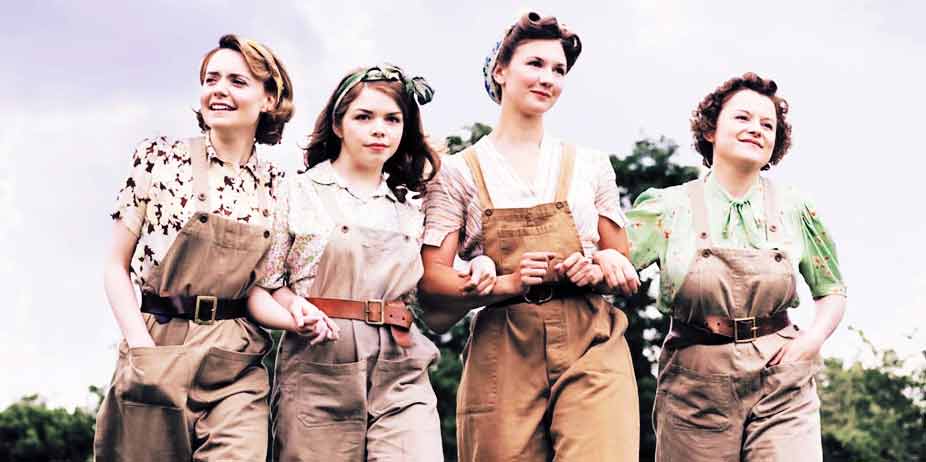
 Land
Girls, Season One (2009)
Land
Girls, Season One (2009)
Have you ever wondered what the women of Britain did while their men were off fighting the Germans in WWII? In honor of their memory, the BBC has produced a five-hour miniseries about the lives of the "land girls."
War is raging overseas and men are being shipped out daily to serve their country. Women all across England are being encouraged to sign up to become "land girls," out working the farms that supply most of the food for the struggling nation. Nancy (Summer Strallen) and Joyce (Becci Gemmell) are the latest to arrive, and the two could not be more different from one another; Nancy is accustomed to being waited on and having nice things, and proves inadequate when it comes to farm work. (She falls in the cow pen twice in one day!) Her greatest pleasure is in sneaking up to the manor house for a luxurious and forbidden bath. Joyce is concerned about her husband, who is due to soon ship out. Their roommates are the lovely and spirited seventeen year old Bea (Jo Woodcock) and her older, unhappily married sister Annie (Christine Bottomley).
Staying on the farm with good-natured Mr. Finch (Mark Benton) and his son Billy (Liam Boyle), as well as under the careful watch of the motherly Esther (Susan Cookson), the girls experience the nuances of bitterness, fear, grief, and romance as they struggle to find a place in an environment much different from their previous lives. And up at the manor house, even more intrigue is to be found when it becomes apparent that the marriage between Lord and Lady Hoxley (Nathanial Parker, Sophia Ward) is on the rocks. Throw a paranoid sergeant of the home guard into the mix, and you have a blend of intrigue, suspicions, estrangement, and heartache that does its best to be taken seriously but doesn't quite measure up. The miniseries feels as if it wants to be grown up, but the spark isn't there -- and it doesn't help that it is a tad light on explanations and doesn't really define minor characters very well. The final episode leaps several months ahead in the timeline and includes out-of-character behavior without bothering to tell us what happened in the meantime. It also does not have a concrete ending since it fails to tie up one major plot line.
Then there are the clichés (the series is almost painfully predictable, although charming) and the historical inaccuracies. Among the latter are minor flubs such as the uniforms of the land girls being the wrong color and them not wearing uniforms all the time contrasted with more serious errors that include painting Americans as racists and philanderers. (None of the Americans we encounter, with the exception of the black soldiers, are at all nice; they threaten and intimidate the black soldiers, enforcing segregation when that was a non-issue in that part of the country and certainly not as bad as is shown here, and seduce local girls.) Some have also taken offense at them writing the Home Guard as paranoid, rule-breaking bullies who answer to the whims of the lady of the manor. Surprisingly, while some serious topics are handled there is not much actual content. It seems the BBC wanted this to be appropriate for all ages and I am grateful for that, however -- there are still major concerns worth nothing.
Because Lady Hoxley is a truly cruel woman constantly harassing her husband, it does not take him long to start having an affair with Nancy; the most we see is them kissing passionately a couple of times, and once her waking up beside him in the hayloft. One early scene finds him catching her sneaking a bath in the manor -- she is decently covered with a towel but it's implied he saw more. Annie also has an extra-marital affair with a drifter, although her sister chastises her for it. Bea is seduced by an American soldier, who gets her pregnant (we see them kissing and him dressing afterward). Married couples act romantically toward one another; there is some mild suggestive dialogue here and there. There's no bad language worth nothing, but some mild violence in the form of fist fights, brief glimpses of war, and a struggle that results in a man being fatally shot. It's implied but not shown that a horse is shot to death after experiencing a bad injury.
One might assume I did not enjoy this miniseries; that is not the case. Somehow, it manages to be engaging and the female characters are quite likable in spite of their faults -- Bea in particular is delightful if foolish. I must also commend the cast for their marvelous performances -- there was not a weak one in the lot, and quite a few of the antics are funny in their own right, such as when the farmer decides to sell black market carrot whiskey. The heartfelt interactions between various individuals, as well as the subtle humor, make this quite a fun little series, but I must admit that the stereotypes, such as painting Lady Hoxley as such a wretch in order to justify and make the audience root for her husband to run away with Nancy, and also of taking an intentional and unnecessary dig at the Americans, not to mention diminishing Annie in my eyes by having her choose to betray her husband with another man, somewhat soured the overall experience.
